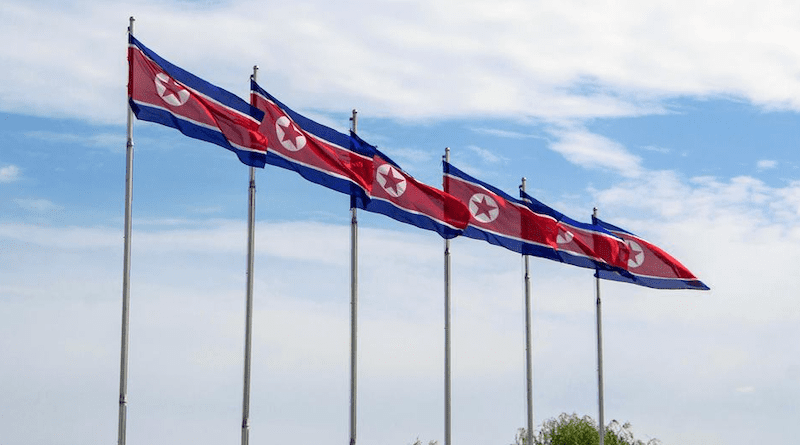Disbandment Of UN Monitoring For North Korea And Its Implication For Security Of Korean Peninsula – OpEd
The recent disbandment of the United Nations panel tasked with monitoring North Korea’s compliance with international sanctions marks a critical juncture in the ongoing efforts to regulate the hermit kingdom’s nuclear and ballistic missile ambitions.
This paper examines the implications of Russia’s veto to extend the panel’s mandate, its impact on the stability of the Korean Peninsula, the intricacies of Russian-North Korean relations, and the vital role China could play in navigating future diplomatic terrain. Additionally, this analysis contemplates the potential acceleration of an arms race in the region and underscores the urgent need for renewed international engagement and responsibility, particularly from Russia and China, to mitigate escalating tensions and ensure regional security.
Russia’s veto of the UN expert panel’s renewal, responsible for monitoring North Korea’s adherence to sanctions, creates a crucial void in global oversight capabilities. Highlighted by Al Jazeera on March 29, 2024, this action faces international criticism for potentially weakening efforts to control North Korea’s nuclear and missile advancements. The dismantling of this key supervisory entity might inadvertently encourage North Korea to intensify its arms development, as illustrated by the recent launch of what is believed to be an intermediate-range ballistic missile, a development reported by Reuters on April 2, 2024. This incident reflects the broader security challenges on the Korean Peninsula, emphasizing how the lack of robust monitoring mechanisms can lead to increased military activities and the proliferation of weapons. The global community now faces the task of addressing this gap in oversight, striving to prevent further escalation in a region already marked by significant geopolitical tensions and the looming threat of arms expansion.
The termination of the UN panel dedicated to monitoring North Korea’s compliance with sanctions is poised to heighten instability across the Korean Peninsula significantly. North Korea’s relentless progression in missile technologies, particularly with its recent tests of advanced hypersonic missiles, poses a stark threat to both regional peace and broader international security. This escalating arms development risks sparking an arms race, undermining the fragile equilibrium of power in the area. Furthermore, the absence of a rigorous oversight mechanism increases the likelihood of misunderstandings or accidental escalations that could spiral into open conflict. Such developments underscore the urgent need for effective measures to mitigate the potential for heightened tensions and ensure the maintenance of stability within this geopolitically sensitive region.
Russia’s veto against extending the UN panel, potentially tied to claims of arms dealings with North Korea, underscores the intricate dynamics at play in the Korean Peninsula’s geopolitical landscape. This act not only reflects Russia’s strategic agenda but also blurs the lines between its aspirations and those of North Korea, thus muddying the waters for international diplomatic endeavors aimed at the peninsula’s denuclearization.
On the other hand, China emerges as a critical figure in this complex puzzle. Its historical alliance with North Korea grants it considerable influence over Pyongyang’s actions. By choosing to abstain from the vote, China signals a preference for diplomatic solutions and political dialogue over the imposition of unilateral sanctions. This stance by China opens a door to potential diplomatic negotiations and underscores the need for a nuanced approach to resolving the tensions that mar the Korean Peninsula, highlighting China’s indispensable role in steering the region towards peace and stability through constructive engagement.
In light of North Korea’s expanding military capabilities, the international community, spearheaded by influential nations such as Russia and China, is called upon to play a pivotal role in mitigating the situation. North Korea’s advancement in military technology poses a severe risk to both the stability of the Korean Peninsula and global peace. This necessitates a collaborative international effort aimed at reducing tensions and promoting a climate ripe for dialogue.
Given China’s considerable sway over North Korea and Russia’s strategic motives, both nations are in a unique position to lead efforts toward diplomatic engagement. Their involvement is crucial in guiding North Korea towards adopting a stance that is less inclined towards provocation and more towards constructive dialogue. By acting as mediators, Russia and China can help pave the way for meaningful negotiations, thus addressing the critical security concerns that currently loom over the Korean Peninsula and fostering a more stable and peaceful regional environment.
The disbandment of the UN panel monitoring North Korea sanctions compliance presents a critical challenge to regional stability and international security efforts. It underscores the urgency for a nuanced, multilateral approach to address the complex dynamics of the Korean Peninsula. Engaging China’s influential role and urging Russia to reconsider its stance are pivotal steps toward mitigating the risk of an escalated arms race and fostering a conducive environment for dialogue. The international community must prioritize diplomatic solutions over punitive measures, emphasizing the importance of collaboration, responsibility, and proactive engagement to ensure the long-term stability and security of the Korean Peninsula and beyond.
The opinions expressed in this article are the author’s own.
References:
- “Russia blocks renewal of UN panel monitoring North Korea sanctions.” Al Jazeera, March 29, 2024.
- Park, Ju-min. “North Korea fires suspected intermediate-range ballistic missile.” Reuters, April 2, 2024.
- Panda, Ankit. “North Korea’s Missile Program and Sanctions: The Strategic Impact of Evading Controls.” The Diplomat, April 5, 2024.
- Smith, Jeffery R. “The Russia-North Korea Nexus: A New Era of Strategic Partnership?” International Affairs, Vol. 100, No. 2, 2024, pp. 433-450.
- Lee, Jenny. “China’s Role in the Korean Peninsula: A Policy of Engagement and Strategic Patience.” Asian Studies Review, Vol. 48, No. 3, 2024, pp. 365-383.
- Kim, David E. “The Korean Peninsula Crisis: Lessons from Previous Negotiations.” Journal of Peace Research, Vol. 61, No. 1, 2024, pp. 104-117.
- O’Neill, William G. “Sanctions, Security, and North Korea: A Global Perspective on the Efficacy of International Pressure.” Global Security Review, Vol. 22, No. 4, 2024, pp. 489-507.

